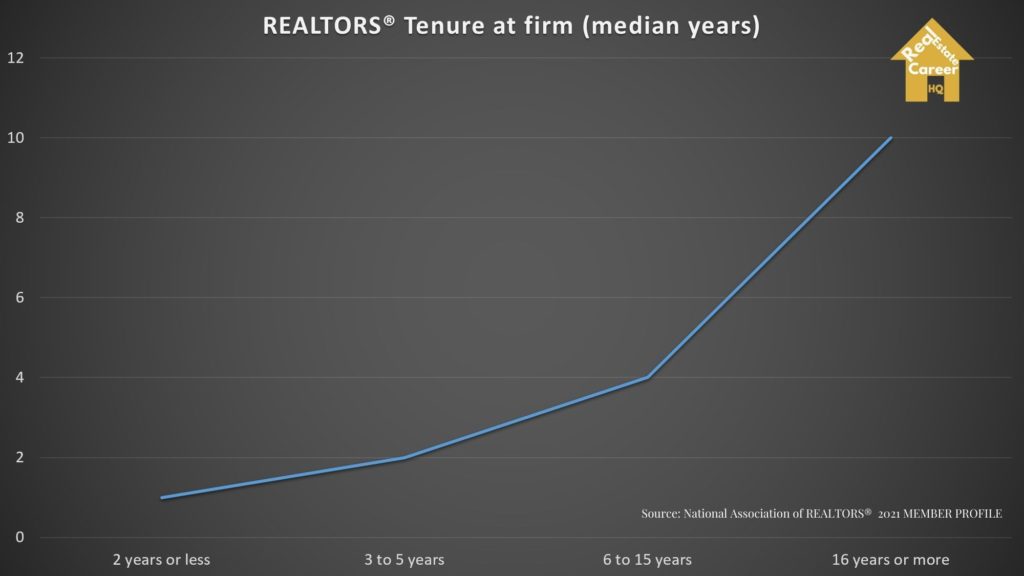(**) Disclosure: This post may contain affiliate links, meaning RealEstateCareerHQ.com will get a commission if you decide to make a purchase through the links, but at no additional cost to you.
Not all real estate agents will fall in love at first sight with their brokerage firm and become happily hereafter. Once you have been working in the field for some time, you will better understand the support you really need and whether the office culture aligns with your practice.
If you and the real estate office are not compatible, you might consider switching to another broker.
According to the National Association of REALTORS® (NAR) 2021 Member Profile, the median tenure for REALTORS® with their current firm is five years. This is a slightly shorter period than the median employee tenure (4.1 years) of all workers. (Bureau of Labor Statistic January 2020). Therefore, real estate agents changing broker is really not an uncommon phenomenon.
Most licensed realtors are self-employed where they receive no benefits or pension from their brokerage. Also, they mostly work independently and may not show up at their office regularly. Since real estate agents tend to have less tie with the company, you might think this would be an easy decision to switch around.
This is simply not true because this change could have a significant impact on your real estate business. You must do your homework and carefully though out each and every aspect.
When looking at your options, it’s important to examine what each company offers and how they may compare. Are there certain benefits that one of them offers that will work better for you? Do they offer more competitive pay or commission rates? What about training programs?
The decision could be difficult and time-consuming, not only that we think about ourselves but also our clients as well. In this post, I will go over the entire thought process of what a real estate agent should consider before changing brokers.
But before we start, I want to give a brief disclaimer. This post is not intended as legal advice or state/federal real estate training. It is for general information only. Please always follow your State laws and best practices.

Do you really need to switch? Think twice!
You probably have some idea why you want to make a switch. But before you made up your mind, I want to ask you one more time, is that what you really need to do?
“Needs” versus “Wants”
Regardless of which office we place our business with, there will always be some components that we will not be totally satisfied with. Are the things that you dislike about your existing firm so critical that you cannot tolerate them? or they may just be “good-to-have” but not necessarily be essential to your business.
A few years ago, an agent friend told me that their brokerage would issue a physical commission cheque rather than deposit directly to his bank account. Another real estate broker knew about it and approached my friend that their office can offer such deposit services.
Yet, this was a “nice-to-have” for my friend. But it wasn’t incentivized enough for him to change broker.
On the other hand, I met a realtor where she used to deal with residential properties. But later on, she started shifting her focus to the commercial markets. (i.e., offices, retail stores.) Since her brokerage was not specializing in this segment, they do not have the resources and expertise to support her. Therefore, she found another one that could accommodate her business needs.
Here’s another post I wrote with the “Top 8 Reasons Why Real Estate Agents Change Brokers”
Have you talked to your existing real estate broker?

Sometimes, we jump to the conclusion too quickly without speaking to the other party first.
Real estate brokers hate to see their productive agents leaving. It costs them time and resources to train a new agent. If the reason you’re leaving a firm is the commission split, in many instances, you could try negotiating a better term. Just show them what the market rate is and why you worth that amount.
You may also raise other requests. In the commission deposit case I talked about earlier, my friend spoke to his office. Although the broker did not act on it immediately, they did upgrade the system to automatic deposit after a few years.
However, some tweaks can be done, and some are unlikely to happen. For instance, request a broker to change its business focus from residential units to commercial just for one sales agent. Or asking them to change their business model from a small local brokerage to a franchise system.
What would happen to my real estate listings upon changing broker?

If you really decided to leave the current firm, the next step is to figure out what can be done with your existing business.
Most listings are signed between the broker and the clients. If you are already working on a listing for a client, it’s unlikely you can bring it to the new firm.
Will you consider completing the sales first before you make the switch? Else, another agent in your existing firm would replace you and become their long-term trusted salesperson. On the contrary, if new listings keep coming in, it would be a never-ending game.
Key Realty has an excellent article which gives some great insight on this topic.
If a broker does agree to let the agent take their listings to the new broker, here’s what needs to happen:
1. The seller must agree that they want to be represented by the new brokerage.
2. The original brokerage needs to release the seller from their agency agreement and remove the property from the MLS and cease all other marketing efforts.
3. A new listing agreement must be executed between the client and the new brokerage.
4. The seller must be provided with the new brokerage’s consumer guide to agency relationships.
Quote from Key Realty: Avoiding Legal Pitfalls When Transferring to a New Broker
Can I still contact my existing clients?

The database of a real estate agent is one of the most valuable assets. Whether you can contact them after switching depends on the contract you signed with the previous firm. For example, is there a non-compete clause? Did it specify who has ownership of the book of business?
I personally have many real estate agents in my connections. They usually would notify me when they move to a new firm. However, I think the problem becomes tricky when the client was a lead provided by the broker.
Furthermore, some brokerages hire salaried sales agents to look after their clients. So high chances are those clients belong to the brokerage.
Since there could be many legal terms involve, it’s better to hire a lawyer to review the contract before you take any action.
Where can real estate agents find a new brokerage?

Without a better alternative, you would have no choice but to stay with your current office. So start developing a list of what brokerages that you are interested in working with. If you don’t know where to find your ones, you may do a Google Search for a list of brokerages in your area.
You may also check your connections in the local NAR chapter or real estate groups on Facebook. I joined several Facebook groups. Their members are very active and helpful. You may ask them which brokerage would they recommend in your local area. (Just beware that if you and your existing broker are Facebook friends, they could see your postings.)
You can also find the brokers that are actively looking to expand their sales team through job posting sites.
Once you found the real estate firms you are interested in, you should do some homework. You may look at their third-party rating and see what consumers and existing agents say about it.
These usually can be seen on their Google Business Page, Facebook Page, Glassdoor or Better Business Bureau (BBB). To get a first hand feedback on what it is like working in that company, try connecting with their sales agents through LinkedIn. Ask them what they like or dislike about this brokerage.
How to determine whether the new brokerage is suitable?
Instead of having your thoughts all over the place, it’s better to write down your business needs. For example, you may write something like, I need a brokerage firm that
- Allows me to recruit other sales agents
- Utilize technology so I can work remotely
- Do not have meaningless meetings or event that occupied my work hours
- Offer at least 10% more of my current commission rate
- With office space close to where I live
- Provide marketing and admin supports
- Have a long-term plan for me to open a branch
- Gives me great flexibility to conduct business in my way
- Have a reputable brand that my clients will recognize
Remember, you can’t win at all things. Focus on the vital component that you value the most and help move your real estate business forward. Then give each item a rating from 1 to 5, add them up and see which firm would score the most.
How to tell your real estate broker you are leaving?
Although you can do so through email, phone, or text messages, the most respectful way is to do so in person. In the least, it should be done through an online meeting.
I understand that there could be something you are unhappy about with the current broker. But keep in mind that you are not trying to teach them a lesson. Even you are resigning from their office, but there are chances that you will come across them in future deals. Your ultimate goal is to end this relationship professionally and peacefully.
However, there are certain instances meeting in person may not be suitable. For example, you and your real estate broker have a terrible relationship, and resigning in person will only cause a scene.
Regardless of which method you use, it should be accompanied by a signed official resignation letter.
Here’s a sample of a letter of resignation for real estate
I found this template on the site, Sample Resignation Letters. It is clear, simple, and straightforward. I made some revisions so you may include your own details in it.
{Date}
{Manager’s name}
{Title}
{Company’s name}
{Company’s address}
RE: Resignation
Dear {Manager’s name}:
This is to inform you that I have accepted a real estate agent position in another agency. Therefore, I would like to offer my resignation effective on {Your official termination date}.
I appreciate the professional development and growth from {Company’s name}, and in particular, from you. Your mentoring support has encouraged me, and I hope that we will continue our relationship as I move forward in my career.
If there is anything I can do, please don’t hesitate to ask me. I can be reached at {Your phone number or email}
I wish you and {Company’s name} continued growth and success in the future.
Sincerely,
{Your name}
How long does it take real estate agents to switch brokers?

The time it takes a realtor to switch brokers may take one week to a month. But it depends on whether your existing broker has any advance notice requirement. Some may require you to let them know two weeks or one month in advance.
Then you’ll need to notify the Real Estate Commission about the change. Some states may require the real estate brokers to submit the change application. Also, don’t forget to inform the E&O insurance company as changing firm may have an impact on your coverage.
Actual logistics real estate agents need to consider upon changing firms
I won’t talk about the obvious things, such as printing new business cards, since I’m sure you and your new broker will handle them regardless.
Rather, I’ll just focus on the iterations where agents may overlook during the transition.
Client communication during the transition

Most agents use his/her own cell phone so that part would not be a concern. However, some agents are using the email address provided by their real estate brokerage. The format is usually something like {agent’s name}.{company’s name}.com.
This can be a huge problem upon changing brokers as you will have no access to it afterward. If you have a good relationship with your brokers, you may ask them whether they can redirect the messages to your new address during the transition period. (i.e., in the next three months.)
Another good way to let your clients and connections know about your new email address is to keep in touch with them by sending them regular e-newsletters. I found that many people do not type in my email address nowadays. They usually just find my recent e-newsletter and hit reply when they want to reach me.
In the e-newsletter, you may share your life at the new brokerage firm. Take photos or clips of your new offices and colleagues. This would remind your connections that you have changed office, and it also helps them get to know what it is like working with you at the new firm.
Once again, you should review the broker contract whether you can contact your clients after the switch. If so, is there any restriction on when to do it?
As a real estate agent, staying in touch with potential buyers and sellers is critical to the success of your business. The world of email marketing can be intimidating, but it doesn’t have to be. That’s why we’re excited to share this valuable resource with you! Click on the link to discover a comprehensive guide on how to utilize email marketing to grow your real estate business. (**) You’ll learn tips and tricks for creating effective emails, building your email list, and automating your campaigns for maximum efficiency. Don’t miss out on this opportunity to take your real estate business to the next level!
Update your business website

If you have ownership of the business website, you just need to update the new contact info. However, I surveyed different real estate agents, and about 64% of their business websites are hosted by their current real estate brokers. If that is your case, you’ll have to get a new domain and hosting.
If you have written blog posts on the old site, you may ask your existing brokers whether you can transfer them to the new site.
As for the new site, you can either use one provided by the new broker or ask them whether they allow you to build one on your own. This way, you can customize it to fit your business and have full ownership of it.
If you are looking for a trusted firm to build a customized website for your real estate business, be sure to check out AgentFire. (**) They have great tools for your real estate online marketing. You can start small or big, to capitalize on digital opportunities at your own speed.
Update your online profiles
The vast majority of real estate agents have some online presence these days. They could be on Facebook, LinkedIn, Twitter, Instagram, Youtube, BiggerPocket, HomeLight, or Zillow. So you should update your details there accordingly.
Also, don’t get the Google Business Page, and make sure it will direct visitors to the correct office address.
Final thoughts about real estate agents changing brokers
- Before you make the move, make sure you weigh all the pros and cons. Your decision should be based on your analysis and not just on feeling.
- Don’t just think about yourself, you must put yourself in your clients’ shoes too. Is it likely that your clients will move the business with you? If so, what is the client’s retention rate of changing brokers?
- Some real estate brokers have a dedicated team in helping agents to transfer their business to them. When finding a new broker, you may look for one with such support.
- To minimize disruption to your business, it’s better to change brokers during a slow season.
So that’s all I can share for now about real estate changing brokers. I hope this post is helpful to you.
Do you have any experience with switching real estate firms? If so, please share it in the comment section below.
Looking to succeed in the real estate industry? Subscribe to our exclusive email list today and gain access to expertly curated real estate guides from industry leaders, as well as discounted CE courses and the latest industry updates. From marketing strategies to virtual staging techniques, our handpicked resources cover everything you need to know to stay ahead of the game. Click here for more details!
Disclaimer: The information in this post is for general information only, and not intend to provide any advice. They are subjected to change without any notice, and not guaranteed to be error-free. Some of the posts on this site may contain views and opinions from individual not related to JCHQ Publishing. They do not necessarily reflect our view or position.
(**) Affiliate Disclosure: Please note that some of the links above are affiliate links, and at no additional cost to you. Our company, JCHQ Publishing will earn a commission if you decide to make a purchase after clicking on the link. Please understand that we include them based on our experience or the research on these companies or products, and we recommend them because they are helpful and useful, not because of the small commissions we make if you decide to buy something through the links. Please do not spend any money on these products unless you feel you need them or that they will help you achieve your goals.
Reference:

